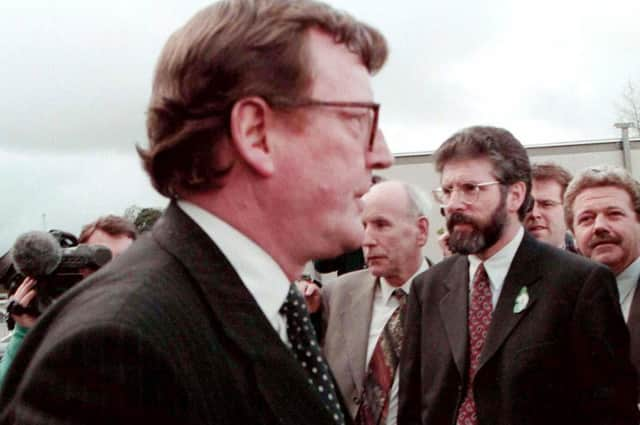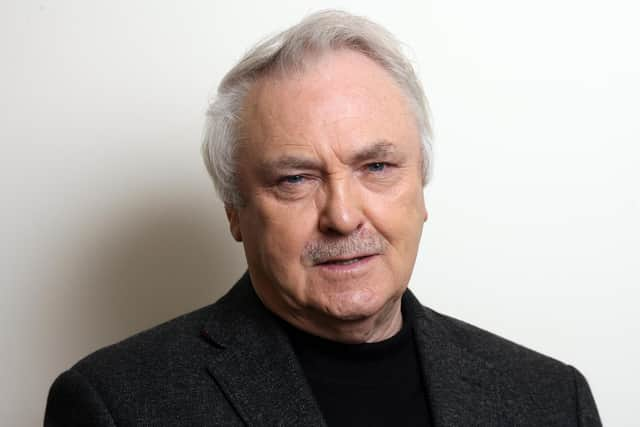Eoghan Harris: David Trimble wasn't 'fascinated' by Gerry Adams - he could barely tolerate his presence


I am happy to do so, although I am still sad about the failure to invite me, the author of his Nobel Prize speech, to a recent unveiling of a bust of Trimble in Leinster House. Apart from Arlene Foster, no unionist politician contacted me privately to express sympathy, never mind protest publicly at my absence.
Some of my nationalist friends made remarks like: “You got no thanks for looking after that lot – hope you’ve learned a lesson.” Afraid not. Being snubbed for reasons still unclear, does nothing to shake my belief that unionists are innocent victims of the Provisional IRA’s vicious campaign, followed by Sinn Fein turning the Good Friday Agreement into a campaign for a united Ireland.
Advertisement
Hide AdAdvertisement
Hide AdHere in the Republic, the media repeatedly gives the impression of being more tetchy about David Trimble than Gerry Adams. This is reinforced by media comment on the annual release of state papers which has two tropes: the brilliance of the officials in our (Ireland’s) Department of Foreign Affairs (DFA) in running rings around the Brits, and the slowness of unionists to grasp what is good for the them. The Irish historian John Bowman summed up a general opinion – clearly shared by the DFA. "It was undoubtedly the case that the Irish government had by far the most sophisticated and the most knowledgeable experts involved in these talks."


Last week, RTE’s David McCullough reached new heights of smugness promoting that narrative, which ran all day, culminating in the Six One TV bulletin leading off with the following bald statement presenting Trimble in a poor light. “The former Ulster unionist leader David Trimble seriously misread Sinn Feins position on decommissioning after a meeting with Gerry Adams in September 1998, according to newly released government documents. Irish officials believed Mr Trimble was not used to Mr Adams subtlety of argument and presentation, leading him to mistakenly believe decommissioning was imminent."
RTE’s source was senior DFA official, David Donoghue, who in 1998 wrote patronisingly: " It seems likely that Trimble who is perhaps not used to Adams’ subtlety of argument and presentation, is seriously misreading Sinn Féin’s position” Translated: Trimble wasn't intellectually up to negotiating with Adams.
Did it never strike Donoghue – as it certainly strikes me – that Adams deliberately gave Trimble the false impression that he was ready for decommissioning – this being the same truthful Adams who was never in the IRA, knew nothing about Jean McConville, Bloody Friday, or the Canary Wharf bomb.
Advertisement
Hide AdAdvertisement
Hide AdThe RTE trope that unionists are slow horses was followed by another favourite trope – that Gerry Adams fascinated David Trimble as much as he clearly fascinates southern commentators. Without citing any evidence to support his claim, McCullough wrote: "Despite his visceral distaste for republicanism and anything to do with the IRA, Trimble appeared fascinated by Adams."
The notion that Trimble was "fascinated" by Adams is another DFA delusion. Dean Godson’s biography of Trimble, Himself Alone, shows that Trimble could barely tolerate Adam's presence. Adams was so aware of Trimble’s almost physical revulsion. that as a control move, he made constant attempts to shake hands with Trimble.
The fantasy that unionists suffer from of false consciousness, and don’t know their own minds, has blinded both southern politicians and the DFA down the years.
Even Garret FitzGerald, Irish foreign minister during the Sunningdale negotiation, and a determined enemy of the IRA, wasn't immune from condescending stereotypes about unionist ‘false consciousness’.
Advertisement
Hide AdAdvertisement
Hide AdWriting in Towards A New Ireland in 1972 he said: “Even to-day the deep-rooted, but rarely admitted belief that ultimately Irish unity must prevail, lies at the heart of many Northern Protestant attitudes."
Above all, the DFA has never accepted that the Good Friday Agreement (GFA) was, in unionist eyes, what the Oslo process between Israel and the PLO explicitly contemplated – a "final-status negotiation", not some open-ended, temporary fix leading inexorably to a united Ireland. On the contrary, Sean O hUiginn, former head of the Anglo-Irish Division saw the GFA as opening the door to “change”.
In a 2023 interview with Dion Fanning in the Currency – which predictably began by telling us us he was “considered a giant intellectually by those who worked with him on all sides” – O hUiginn revealed no concern for the fate of the minority on the island whom we profess to cherish in a future united Ireland. "Unionists have lost the ability to protect the union democratically or demographically from their own resources and they are not well placed to recruit allies.”
His view of the GFA is that it's just a stepping stone to "change", expressing his satisfaction that there “are agreed and solemn rules now for change in Northern Ireland". In short, Ó hUigínn Is insisting that the GFA is not really about devolved power sharing, rather about "change", ie a united Ireland. And who does he think will benefit from that change? “Unionism has a reasonable conviction that almost all change would be against its interest.”
Advertisement
Hide AdAdvertisement
Hide AdFor many years the DFA has followed a green path that is closer to Sinn Fein’s on the GFA than to our professed desire to reassure unionists that their position is safe. The DFA doesn’t care that running rings around the Brits really means running rings around unionists – a position that is first cousin to Sinn Fein’s pretence that the IRA murder campaign was against the Brits when it was really against unionist rejection of unity.
The annual state papers show the DFA never factors in the cruel impact of the IRA's murderous armed struggle on unionists, or admits the Republic's shameful record on border security and extradition. In recent times the DFA weaponised the GFA's principle of parity of esteem by enrolling it the Brexit battle, and mobilising the EU and Washington in a campaign for the Protocol that it knew would undermine the status of unionism.
As I wrote here last year: “We shafted Northern Irish unionists, whom we treated as outsiders, rather than Irish people with whom we claim to seek unity, and to whom, under the GFA, we owed a political duty of care. Yes, it was a great stroke for Dublin and the DFA – if the object was to build distrust and disunion.”
• Eoghan Harris is a Dublin-based commentator and former speech writer to David Trimble